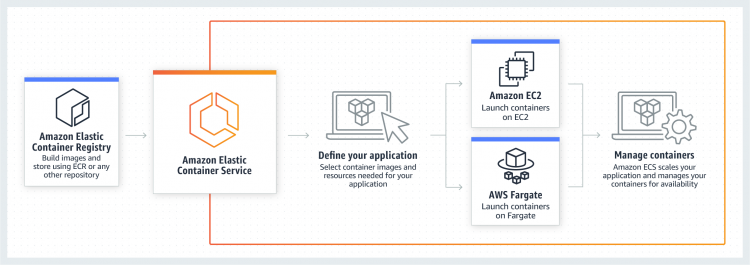- It is a highly scalable, high performance container management service that supports Docker containers
- Allows you to easily run applications on a managed cluster of Amazon EC2 instances.
- Eliminates the need for you to install, operate, and scale your own cluster management infrastructure.
ECS Terms
- Task Definition — This a blueprint that describes how a docker container should launch. If you are already familiar with AWS, it is like a LaunchConfig except instead it is for a docker container instead of a instance. It contains settings like exposed port, docker image, cpu shares, memory requirement, command to run and environmental variables.
- Task — This is a running container with the settings defined in the Task Definition. It can be thought of as an “instance” of a Task Definition.
- Service — Defines long running tasks of the same Task Definition. This can be 1 running container or multiple running containers all using the same Task Definition.
- Cluster — A logic group of EC2 instances. When an instance launches the ecs-agent software on the server registers the instance to an ECS Cluster. This is easily configurable by setting the ECS_CLUSTER variable in /etc/ecs/ecs.config described here.
- Container Instance — This is just an EC2 instance that is part of an ECS Cluster and has docker and the ecs-agent running on it.
- Container agent — This is the agent that runs on EC2 instances to form the ECS cluster. If you’re using the ECS optimized AMI, you don’t need to do anything as the agent comes with it.
- Task definition — An application containing one or more containers. This is where you provide the Docker images, the amount of CPU/Memory to use, ports etc. You can also link containers here, similar to a Docker command line.
- Service — A service in ECS allows you to run and maintain a specified number of instances of a task definition. If a task in a service stops, the task is restarted. Services ensure that the desired running tasks are achieved and maintained. Services can also include things like load balancer configuration, IAM roles and placement strategies.
- Service auto-scaling — This is similar to the EC2 auto scaling concept but applies to the number of containers you’re running for each service. The ECS service scheduler respects the desired count at all times. Additionally, a scaling policy can be configured to trigger a scale-out based on alarms.

Amazon ECS Application
- Microservices – Amazon ECS helps you run microservices applications with native integration to AWS services and enables continuous integration and continuous deployment (CICD) pipelines.
- Batch processing – Amazon ECS lets you run batch workloads with managed or custom schedulers on Amazon EC2 On-Demand Instances, Reserved Instances, or Spot Instances.
- Application migration to the cloud – Legacy enterprise applications can be containerized and easily migrated to Amazon ECS without requiring code changes.
- Machine learning – Amazon ECS makes it easy to containerize ML models for both training and inference. You can create ML models made up of loosely coupled, distributed services that can be placed on any number of platforms, or close to the data that the applications are analyzing.
Amazon ECS Working

